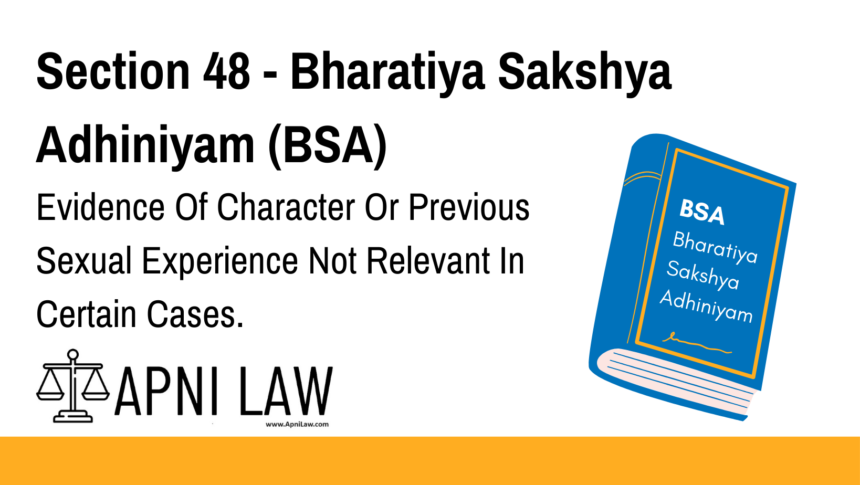Code: Section 48 – Bharatiya Sakshya Adhiniyam (BSA)
In a prosecution for an offence under section 64, section 65, section 66,
section 67, section 68, section 69, section 70, section 71, section 74, section 75, section 76,
section 77 or section 78 of the Bharatiya Nyaya Sanhita, 2023 or for attempt to commit any
such offence, where the question of consent is in issue, evidence of the character of the
victim or of such person’s previous sexual experience with any person shall not be relevant
on the issue of such consent or the quality of consent.
Explanation of Section 48 – BSA
Section 48 of the Bharatiya Sakshya Adhiniyam (BSA) provides a significant safeguard for victims in criminal cases, particularly those involving offenses where consent is a key issue. This provision explicitly disallows the introduction of evidence about the victim’s prior sexual history or their character in trials where the question of consent is central.
The aim of this section is to prevent victim-blaming, which can often occur when the defense tries to introduce irrelevant details about the victim’s past behavior or sexual history. Such evidence can prejudice the jury or judge and distract from the actual issue of whether consent was given in the specific incident being prosecuted.
This section helps maintain a focus on the facts of the case rather than the personal life of the victim, thus promoting a more just and fair legal process in cases of sexual offenses.
Illustration
Example 1: Alleged Sexual Assault
In a case of sexual assault, the defense might attempt to introduce evidence about the victim’s previous sexual encounters. However, under Section 48, such evidence is not relevant to determining whether the victim consented in this particular case. The Court must only consider the facts related to the specific alleged offense.
Example 2: Rape Trial
In a rape trial, the accused may argue that the victim has consented to sexual activity in the past, using this as a defense. However, as per Section 48, the Court cannot consider the victim’s previous sexual history when determining whether consent was given during the alleged incident. The Court will focus solely on the events surrounding the specific accusation.
Common Questions and Answers on Section 48 – BSA
1. Why is the victim’s past sexual history not considered in such cases?
- Answer: Section 48 ensures that the victim’s past behavior does not influence the trial’s outcome. It protects the victim from being unfairly judged based on their prior experiences, focusing the Court’s attention on the matter at hand—the specific question of whether consent was given.
2. What types of offenses does Section 48 apply to?
- Answer: This provision applies to offenses outlined in Sections 64, 65, 66, 67, 68, 69, 70, 71, 74, 75, 76, 77, and 78 of the Bharatiya Nyaya Sanhita, 2023 (BNSS), as well as any attempts to commit these crimes, where the issue of consent is central.
3. Can a victim’s sexual history ever be admitted in court?
- Answer: Under Section 48, evidence about the victim’s previous sexual experiences is generally inadmissible in trials concerning consent. However, in rare instances, other legal provisions may permit such evidence under specific circumstances, but this is exceptional.
Conclusion
Section 48 of the Bharatiya Sakshya Adhiniyam (BSA) plays a pivotal role in safeguarding victims’ rights in cases involving consent. By excluding irrelevant character or sexual history evidence, it helps to ensure that the trial process remains focused on the facts of the case, thus promoting fairness and justice for all parties involved.









